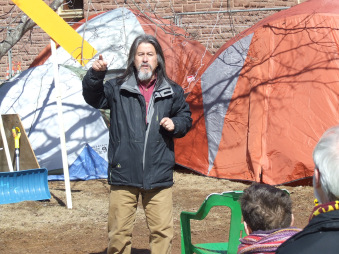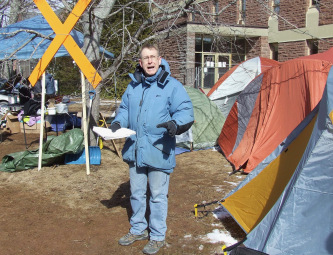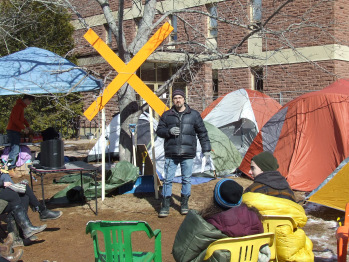
Mt. A Professor Juan Carlos Martinez urges students to keep up their struggle
Students occupying the academic quadrangle at Mount Allison University received enthusiastic support today from several professors during a teach-in organized by the campus group Divest MTA.
The group pitched tents and set up an indefinite occupation in the quad yesterday as part of its campaign to persuade the university to withdraw its endowment fund investments from the fossil fuel industry.
“The world we are living in now is a mess,” Modern Languages and Literature Professor Juan Carlos Martinez told the students during the teach-in.
He added that they shouldn’t depend on their elders to change things. “We are part of the problem,” he said.
Professor Martinez urged the students to keep speaking out in their struggle against the university’s investments in fossil fuel companies, a similar struggle he suggested, to the one being waged in Latin America against Canadian mining companies.
“You are in university now. University is the perfect time to start to act critically,” Martinez said.
Refineries instead of refinement
Economics Professor Stephen Law
“Im really glad you guys are all out here,” Economics Professor Stephen Law told the students.
“Too many people think that nice people shouldn’t make a fuss. I think it’s essential that it’s the nice people who are making a fuss — a nice fuss.”
Law went on to criticize federal and provincial governments for cutting university funding while letting the rich and powerful escape paying taxes.
“We live in a province which is characterized by robber barons, under-taxation and corruption,” he said. “So, what do we get? We get refineries and not refinement.”
Law pointed to a long string of budget surpluses at Mount Allison, yet he said administrators routinely cut spending on academic programs without consulting the rest of the university community.
As for endowment funds, Law said the university’s endowment is approximately $150 million. “It’s one of the top three in Canada on a per-student basis,” he said adding that removing endowment fund investments from fossil fuel companies would mean redirecting a substantial amount of money.
University responsibility
Professor Dave Thomas
Dave Thomas, who teaches Politics and International Relations, said university administrators frequently justify continuing to invest in fossil fuels on the grounds that they have a responsibility to manage funds for the maximum benefit of the university, not to meet political objectives.
Professor Thomas said that five years ago when he taught a course on socially responsible investing, he came across a research article that provided many different perspectives on what administrators call their “fiduciary responsibility.” He argued that term is actually controversial and highly contested.
“The fact that it’s such a contested term is one of the reasons why you’ve seen universities taking positions on divestment,” he said adding that it’s an issue at universities in Canada while internationally many have already withdrawn their fossil fuel investments.
“They weren’t all rounded up and thrown in jail for violating their fiduciary responsibility,” he said.
Mt. A resists changeMeantime, Alex Lepianka — one of the key organizers of Divest MTA — took issue with a statement the university’s director of marketing and communications made to CBC about the student occupation.
Robert Hiscock said the university’s Responsible Investment Committee will be submitting a number of recommendations on investment policies to Mt. A’s highest governing body, its Board of Regents. Hiscock said these will include annual disclosure of investment holdings and “creation of a new Green Fund option for donors.”
Lepianka, who served as a student representative on the committee, said the new recommendations are a cover for the university’s refusal to disinvest from the fossil fuel industry. He added that the recommendations would make more investment information available, but would maintain business as usual.
“We know that we have financial ties to the fossil fuel industry,” Lepianka said. “Because of the university’s ties to the fossil fuel industry, we need to organize…but what these recommendations do is allow the status quo, those financial ties to continue, to leave unchallenged the social context in which environmental degradation happens.”
Share this:




